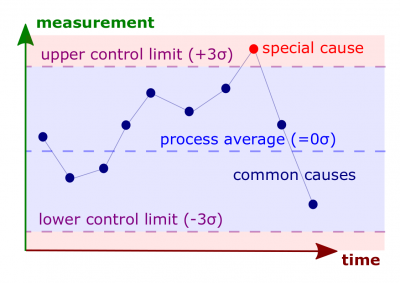Difference between revisions of "Control chart"
| (One intermediate revision by the same user not shown) | |||
| Line 4: | Line 4: | ||
According to [[Juran's Quality Handbook by Defeo (7th edition)]], | According to [[Juran's Quality Handbook by Defeo (7th edition)]], | ||
:[[Control chart]]. A graphical tool used to determine if a process is in a state of (usually statistical) control over time. Most popular are Shewhart statistical process control charts. | :[[Control chart]]. A graphical tool used to determine if a process is in a state of (usually statistical) control over time. Most popular are Shewhart statistical process control charts. | ||
| + | According to [[Cost Accounting by Horngren, Datar, Rajan (14th edition)]], | ||
| + | :[[Control chart]]. Graph of a series of successive observations of a particular step, procedure, or operation taken at regular intervals of time. Each observation is plotted relative to specified ranges that represent the limits within which observations are expected to fall. | ||
==Related lectures== | ==Related lectures== | ||
*[[Controlling Quarter]]. | *[[Controlling Quarter]]. | ||
| − | [[Category: Septem Artes Administrativi]][[Category: Articles]][[Category: Quality Management]] | + | [[Category: Septem Artes Administrativi]][[Category: Articles]][[Category: Quality Management]][[Category: Accounting]] |
Latest revision as of 19:38, 10 July 2020
Control chart (hereinafter, the Chart) is a quality-control tool that represents a graphic display of the results, over time and against established control limits, of a process. They are used to determine if the process is in control or in need of adjustment.
Definition
According to Juran's Quality Handbook by Defeo (7th edition),
- Control chart. A graphical tool used to determine if a process is in a state of (usually statistical) control over time. Most popular are Shewhart statistical process control charts.
According to Cost Accounting by Horngren, Datar, Rajan (14th edition),
- Control chart. Graph of a series of successive observations of a particular step, procedure, or operation taken at regular intervals of time. Each observation is plotted relative to specified ranges that represent the limits within which observations are expected to fall.
